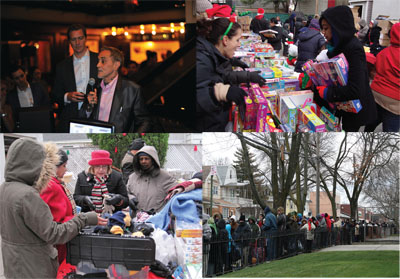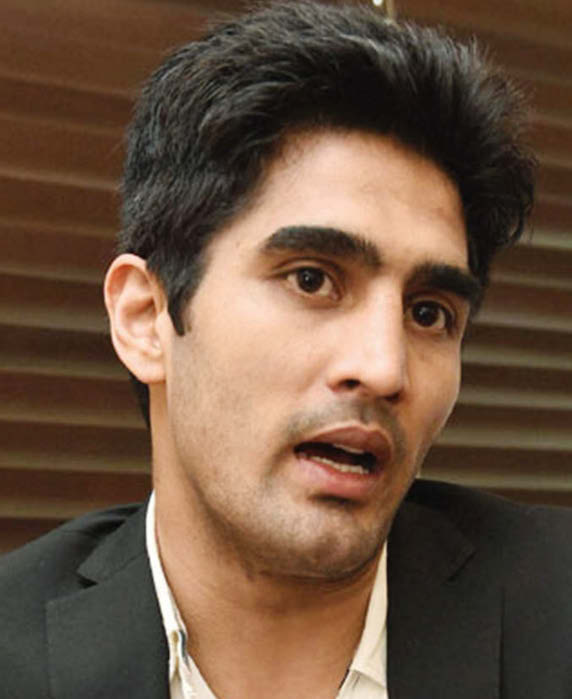
Swami Durga Das lives for fellow human beings
It was late in the morning last month when I walked in to Swami Durga Das’s modest office-cum-ashram, The River Fund, at Richmond Hill for an interview with him for The Indian Panorama. The River Fund is an exceptional nonprofit organization established in three locations in New York to help people by providing them food supplies and other assistance. His office was bustling with daily activities and dozens of people waiting for their cards to be prepared. Swamiji greeted them all with a warm smile and as I much expected, he waded through all my questions with a positively inspiring smile.
Swami Durga Das is unlike any Swamis you have met. Born Michael Portillo into an Italian family, Swami Durga Das was always in search of finding the true meaning of self. He spent his teenage years traveling and seeking more meaning to his life. “I was a Hippie traveling around,” he admits. But he did find the answers he was looking for in India. “I was traveling aimlessly in the 60s when one day someone told me that I should visit India. At that point it sounded all so wonderfully foreign and exciting that I decided to make the trip. Once I set foot in India, I knelt down and kissed the Earth. It was an instantaneous connection that I felt.
There was something profound about India,” he adds. The changes he was adopting weren’t well received by his family in the beginning. He says, “I grew up in Queens. My mother was not a big fan of me changing my name. Eventually she saw how good this was doing me. Initially when she used to hear me talk about Ma, she used to say ‘I am your only mother’. But she warmed up from the natural Italian jealousy.” India, he says, is the place that changed everything for him. During his visit he met Ma Jaya Sati Bhagawati. Ma was born in Brooklyn and also rendered to a lifetime of proving services to the ones in need. She was the inspiration behind Swami Durga Das’s renunciation of the material world. “As a youth, I was trying to find out who I was. I met Ma and there was an instant connection through her teachings and lessons. I realized that it really is a life of service.
She taught me that ego is what needs to be destroyed; she called it death of the ‘I’. In 42 years of being with her I learned that it is not about me, it is about the journey. So I vowed to serve lifelong,” he says. He reveres the name he was given by Ma. He tells us, “Ma gave me the name of Acharya Swami Durga Kali Saraswati Das. Although I follow Hinduism I do not care if people say I am not a Hindu. It doesn’t matter. With Ma, I learnt that acceptance is the key to serving lifelong. You cannot do your duties if you discriminate. I am a gay man. I am now celibate. But even then, Ma accepted me for what I am.” Unfortunately Ma Jaya Sati Bhagawati passed away two years ago. Yet Swami Durga Das leads his life with all the ideals she taught him. He explains, “Her principal was basic, be the best of who u are inside. As human beings or any living specie, we all have many breaths inside us.
With all the breath you have, what use are you making of these breaths. By Fighting? Or crying? Or hating? She taught me to make use of breaths wisely. By destroying the elements of negativity and using it with wisdom for more positive acts. Of course, there are many other ways to accepting faiths. Ma used to say that if you sit with someone and they say that their way is the only way, you go the other way”.
Swami Durga Das or Swamiji as he is commonly known to everyone is the Executive Director of The River Fund at New York. Although The River Fund has several other establishments throughout the country, the one at Queens was established 21 years ago. Swamiji has been providing exceptional services to people all these years and he wants to continue to do so for as long as he can. “I always tell myself that no one should go hungry. Hunger is a situation that I believe we can eradicate if we put our minds to it. I do my best here at New York by providing food supplies to over 700 families every week.”
The River Fund, founded through Ma, is known for the free quality food services it provides for the less-fortunate who live in or near the vicinity of New York. Every Saturday, Swamiji and his team open the ashram door to hundreds of people who have been lining up for hours. “River Fund operates a client choice pantry on every Saturday. It starts at 7.30. We serve about 500 to 700 families every week. People start lining up at 3 AM. You don’t need any kind of criteria. We don’t turn away anyone, there is no discrimination.
We have a card system. But that is only for us to understand what kind of food requirements the family has, if they are diabetic, or they need formula, etc.” However, it has come to our attention that there are many people who are well-off enough who come every Saturday to get supplies from Swamiji’s ashram. When enquired about this, Swamiji smiles and says, “Every type of human nature comes on our lines. I have seen many different kinds of people who come here and stand for hours. Of course there are people who do that, I’ll be honest. But I am not someone who will go look into that. There are a people who steal millions and compared to that a person who can afford the bill and still comes to us for a grocery bag worth $40 is immaterial. I look at it this way. If this person is willing to stand in the line for about three to four hours, there is a need. And need is what we work with. It is a struggle to survive these days.” The River Fund has other centers in the US. Swamiji elaborates, “We have a center in LA for the HIV affected and senior citizens. In LA they have a brilliant program called ‘Under the bridges’ which literally mean helping people who live under the bridges by providing them with food and shelter. In Uganda and India they have many centers that facilitate providing food for the needy.” The garage is stocked with food supplies for the next Saturday. There were three giant refrigerators to chill frozen products. There is always need for strong financing.
Swamiji explains, “We always have to raise money through grants and donation. We do need continual financial support and we try to get it from different places. As far as supplies are concerned, Food Bank is a partner, City Harvest, Robin Hood foundation, Trader Joes, Broadway Cares, United Way, Hilton Foundation, Costco, private donors and many other organizations are partners with us or they aid us in other ways.” In his long years of service, Swamiji has had his own share of ups and downs. His high point was when he arrived in India for the first time and when he met Ma there. He calls them his two most pivotal moments of his life. Although he faced many lows, he like everyone learned profound lessons from these moments. “Losing my partner to AIDS was the weakest moment for me. It’s not that I am not familiar with death. I embrace death but losing him in that manner and in 9 months was very difficult for me. And losing my Guru was also another weak moment. There were many other lows, like death of the ego, it’s very painful.
But today I am here only because slowly I understood that I have to go on doing what I came here to do irrespective of any highs or lows. And that was it.” When Swamiji decided to renunciate his life to take up Sanyasan, he found the reasons to do so very easily. “Years later I wanted to be a renunciate. I wanted to take up the life of a Sanyasan. Being a renunciate does not mean that I want to stop caring about the world. It means to live in this world by helping the ones in need and not have expectations or demands from the world at all.” Swamiji stresses on spirituality more than religion and he explains why, “Hinduism is our base, but we believe in faith or spirituality. We believe more in Spirituality than religion. According to me, religion is a set of rules and guidelines that help us live a good life. And spirituality is the actual practice of it. This is the reason why I prefer spirituality. All religions preach kindness, compassion, caring, loving and helping others. But spirituality is the aspect that gets us to do all that.” The biggest difference between Swami Durga Das and other Swamis we meet is that he is not a preacher. He lives on ideals he found are apt for him. He is willing to help people when they are wrong but he does not prefer to sermonize. “I am not here to preach. I am not here to say that Lord Hanuman or Lord Ganesha is the way to go. Or to tell people that Jesus Christ or Mary Mother are the right religious leaders to follow.”
Such a thought process could help us in the times we live in. Where fighting in the name of land or religion or other arbitrary factors are highly prevalent. “We live in the most chaotic times. It’s human nature to wage wars, start killing innocents or destroy the environment. Anger is a human nature. But the other side of this nature is kindness. I remember during 9/11 how despite the religious tensions, people across the country came together and helped each other despite the atrocities that were committed. But the question is how long can we be like that. As months went by, everybody went back to their lives and it all changed.” Swamiji explains that while anger and hate are one side to the human nature, the other side is kindness and compassion. What we must understand is what side we want to remain at and master ways to remain on the good side for long. He attributes most of his learning such as this from many Hindu religious texts that he has read.
But it is not certain whether he can return to India permanently to learn more. “I want to go back to India. But I work seven days here. The needs are ever growing here. So it may be a bit difficult.” With that I take my leave and wish Swami Durga Das, his team and The River Fund establishment a very bright success on behalf of the readers of The Indian Panorama.





Be the first to comment